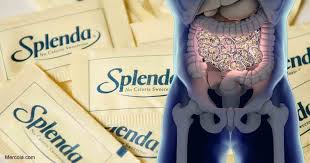
Hidden Dangers Of Splenda
Splenda is an artificial sweetener. It is used a sugar substitute. A lot of people turn to artificial sweeteners like Splenda because they have less calories. Also, they are not supposed to cause a big surge in your insulin level or blood sugar. Also, these sweeteners like splenda are sweeter than sugar. Individuals that suffer from diabetes or obesity use splenda a lot. However, there are hundreds of millions of people that use sweeteners like splenda. You will find splenda in so many different types of foods. Spenda is put in cakes, milkshakes, drinks and even in some medications.
Splenda is also known as sucralose. Splenda is made through a process that starts with sugar and the sugar is coverted to a no calorie sugar. The process selectively replaces three hydrogen-oxygen groups on the sugar molecule with three chlorine atoms. Chlorine is a natural part of salt, which is found in many foods, like lettuce, tomatoes, mushrooms, melons, and peanut butter, and chlorine is added to most public water supplies. Chlorine is also a part of more complex molecules found in such things as lentils, peas, and potatoes. It is a part of daily life. In the case of sucralose, its addition converts sucrose to sucralose, which is essentially inert. The result is an exceptionally stable sweetener that tastes like sugar, but without sugar’s calories. Sucralose isn’t broken down for energy, and is not recognized by the body as a carbohydrate.
However, I have to be honest. There are some health experts that say that splenda is unsafe to consume. They are saying that the health benefits advertised are hype. It appears as if splenda may have side effects although it may not have as many calories as sugar. The debate is over if splenda natural or synthetic.
Known Side Effects Of Splenda
· Gastrointestinal problems
· Seizures, dizziness and migraines
· Blurred vision
· Allergic reactions
· Blood sugar increases and weight gain
· skin rashes
· flushed skin
· panic attacks
· agitation
· dizziness
· numbness
· diarrhea
· skin and joint swelling
· muscle aches
· joint pain and stiffness
· headaches
· intestinal cramping
· bladder issues
· stomach pain
Because there are evidence out their that indicates that splenda has a negative affect on a person’s blood sugar level as well as blood insulin. A person should strongly consider if they want to use it as a sugar substitute.
